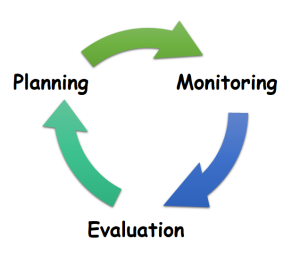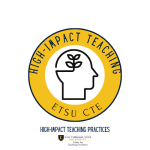48 Metacognition
Metacognition—thinking about one’s own thinking—is a cornerstone of meaningful learning and personal growth. As described in How Learning Works (Lovett et al., 2023), metacognition equips students with the tools to plan, monitor, and evaluate their learning. These skills are essential for becoming self-directed learners, capable of adapting strategies to diverse challenges and lifelong learning contexts.
Metacognitive activities can be seamlessly integrated into your course design to complement and strengthen other pedagogical approaches, including active learning, inquiry-based methods, and Universal Design for Learning (UDL). By fostering students’ ability to reflect on their learning, metacognition supports engagement, motivation, and the development of transferable skills, making it a powerful framework for higher education.
What is Metacognition?
Metacognition involves three interconnected processes:
- Planning: Setting goals, analyzing task demands, and preparing strategies.
- Monitoring: Actively assessing comprehension and progress during learning.
- Evaluating: Reflecting on outcomes to refine future strategies.

In How Learning Works, Lovett et al. (2023) emphasize that metacognition allows students to assess their knowledge and skills, plan their approach, monitor progress, and adjust strategies as needed. This cyclical process transforms students into reflective learners who adapt to challenges and develop lifelong learning habits.
Metacognition also interrelates with other key concepts in this guide:
- Active Learning: By planning and monitoring their engagement, students take a more active role in their education.
- Inquiry-Based Learning: Reflective practices help students generate and refine questions.
- Feedback: Metacognition encourages students to actively incorporate feedback into their learning process.
- Universal Design for Learning: Supporting metacognitive strategies aligns with UDL’s emphasis on providing multiple means of engagement and expression.
Strategies for Fostering Metacognition
1. Planning for Learning
Planning is the foundation of effective learning. As Lovett et al. (2023) explain, expert learners allocate significant time to planning, while novice learners often overlook its importance. Teaching students how to plan enhances their ability to navigate complex tasks and manage their learning.
Ideas for Implementation:
- Use non-graded pre-tests to help students identify what they already know and what they need to learn.
- Have students preview readings and generate guiding questions before class.
- Model expert planning strategies when solving problems or allocating study time.
- Offer structured study plans as part of specifications grading, allowing students to choose pathways that fit their goals.
- Share examples of effective learning strategies specific to your course.
2. Monitoring for Learning
Monitoring involves regularly assessing understanding and progress. This process helps students identify gaps in their knowledge and refine their approach during learning tasks.
Ideas for Implementation:
- Assign reflective “minute papers” or “muddiest point” activities during or after class.
- Encourage the use of metacognitive note-taking techniques, like the Cornell system, which integrates space for questions and summaries.
- Have students generate potential test questions as part of self-assessment.
- Use guided reading questions to reinforce comprehension and promote active reading.
- Incorporate confidence judgments during quizzes, encouraging students to reflect on their certainty and performance.
3. Evaluating Learning
Evaluation closes the metacognitive loop, prompting students to analyze their performance and make adjustments for future tasks. Lovett et al. (2023) emphasize that effective evaluation encourages students to develop resilience and adaptability.
Ideas for Implementation:
- Assign “exam wrappers” that guide students to reflect on their preparation, performance, and strategies for improvement.
- Include reflection components in major assignments, asking students to analyze what worked and what didn’t.
- Ask students to formally respond to feedback, identifying areas for revision and growth.
- Require strategy projects where students outline their approach to a task and evaluate its effectiveness.
High-Impact Tips from ETSU Instructors
 One of the biggest changes I made recently focused on “Making Thinking & Learning Visible.” I wanted to move further away from the stereotypical (boring) large lecture course by creating more opportunities in class for thinking and learning. One of the many activities I tried for this topic was MYST, which stands for Me, You, Space, and Time. “Me” asks the question, “How am I modeling my own thinking?” I gave much more attention to detailing my thought process and the thought process of successful students in solving problems and in studying.
One of the biggest changes I made recently focused on “Making Thinking & Learning Visible.” I wanted to move further away from the stereotypical (boring) large lecture course by creating more opportunities in class for thinking and learning. One of the many activities I tried for this topic was MYST, which stands for Me, You, Space, and Time. “Me” asks the question, “How am I modeling my own thinking?” I gave much more attention to detailing my thought process and the thought process of successful students in solving problems and in studying.
After each exam, students also completed a reflection on what worked and what did not work in terms of their study habits, preparation, and their actions during the exam. I received very positive feedback about the reflection assignment and will keep using it in the spring as an extra credit assignment.
Brittany Butler | Chemistry, CHEM 1030 Intro Chem Survey, CHEM 1110 General Chemistry I, CHEM 1120 General Chemistry II
Why Metacognition Matters
Metacognition not only fosters academic success but also prepares students for professional and personal challenges. It aligns with principles of active learning by encouraging students to take ownership of their education, and it empowers all learners to develop skills for success, regardless of their starting point.
While many students arrive at college with limited metacognitive skills, these can be taught and cultivated (Cohen, 2012; Steiner, 2016). Evidence shows that embedding metacognitive activities into specific courses, rather than teaching them as stand-alone lessons, enhances transferability and impact (Steiner, Dean, Foote, & Goldfine, 2016).
Key Takeaway
Sources and Attribution
Primary Source
This section is informed by and adapted from:
- Kennesaw State University, Faculty Development and Recognition. Self-Directed Learners.
- Available at: Kennesaw State Faculty Development
For a full list of references and additional resources, please follow the link above.
Use of AI in Section Development
This section was developed using a combination of existing research, expert-informed insights, and AI-assisted drafting. ChatGPT (OpenAI) was used to:
- Summarize key principles of self-directed learning into a structured and accessible guide for educators.
- Clarify best practices for fostering student autonomy, metacognitive skills, and self-regulated learning.
- Enhance readability and coherence, ensuring that strategies for developing self-directed learners are both research-supported and practically applicable.
While AI-assisted drafting provided a structured foundation, all final content was reviewed, refined, and contextualized to ensure accuracy, pedagogical effectiveness, and alignment with cited sources. This section remains grounded in institutional best practices and respects Creative Commons licensing where applicable.
Media Attributions
- Learning-Cycle-NEW-e1524521233276
- CTE Badges (6)
